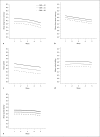Overweight in midlife is related to lower cognitive function 30 years later: a prospective study with longitudinal assessments
- PMID: 20606436
- PMCID: PMC3202952
- DOI: 10.1159/000314874
Overweight in midlife is related to lower cognitive function 30 years later: a prospective study with longitudinal assessments
Abstract
Aim: To examine if the body mass index (BMI) in midlife is related to cognitive function 30 years later in a dementia-free sample.
Methods: BMI was reported in 1963 at age 50-60 years, and cognitive abilities were examined 30 years later in a longitudinal design with 5 measurement occasions at 2-year intervals (n = 417). The cognitive abilities examined included tests of long-term memory, short-term memory, speed, verbal and spatial ability.
Results: Multilevel modeling adjusting for demographic and lifestyle factors, and relevant diseases showed that a higher BMI in midlife predicted lower test performance 30 years later. Significant associations between BMI and level of performance were found in all cognitive abilities; however, a higher midlife BMI was not associated with steeper cognitive decline.
Conclusion: Our results indicate that midlife overweight is related to lower overall cognitive function in old age. The fact that BMI-related effects were noted in mean-level cognitive performance, whereas only one ability showed differences in slopes, suggests that the negative effect of overweight has an onset before the entry into very old age.
Copyright 2010 S. Karger AG, Basel.
Figures
References
-
- Gorospe EC, Dave JK. The risk of dementia with increased body mass index. Age Ageing. 2007;36:23–29. - PubMed
-
- Rosengren A, Skoog I, Gustafson D, Wilhelmsen L. Body mass index, other cardiovascular risk factors, and hospitalization for dementia. Arch Intern Med. 2005;165:321–326. - PubMed
-
- Whitmer RA, Gustafson DR, Barrett-Connor E, Haan MN, Gunderson EP, Yaffe K. Central obesity and increased risk of dementia more than three decades later. Neurology. 2008;71:1057–1064. - PubMed
-
- Cournot M, Marquie JC, Ansiau D, Martinaud C, Fonds H, Ferrieres J, Ruidavets JB. Relation between body mass index and cognitive function in healthy middle-aged men and women. Neurology. 2006;67:1208–1214. - PubMed
Publication types
MeSH terms
Grants and funding
LinkOut - more resources
Full Text Sources
Other Literature Sources
Medical


